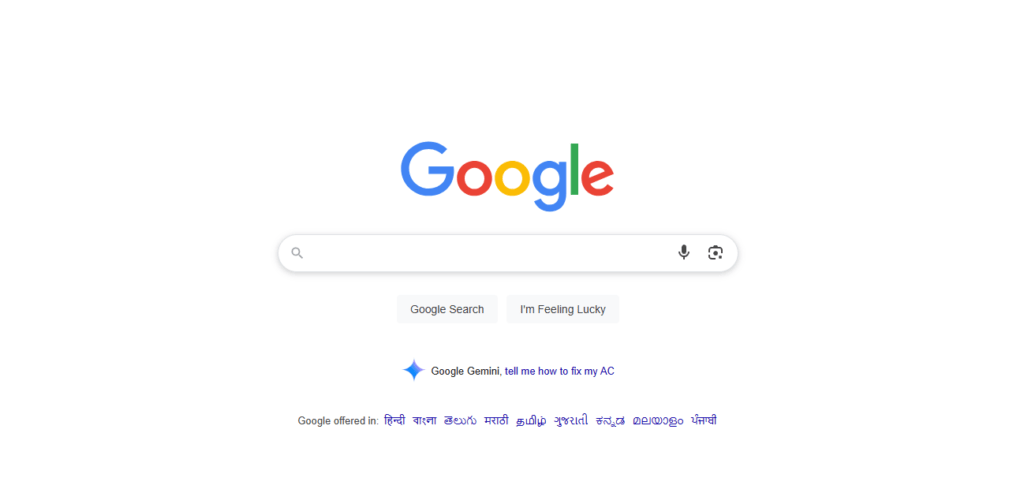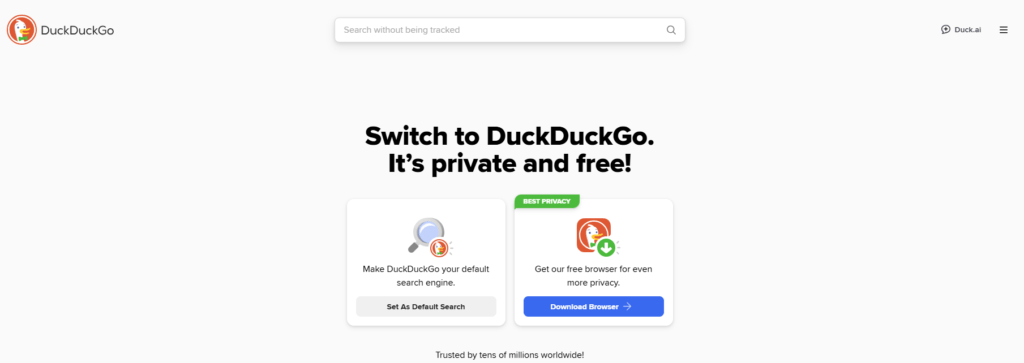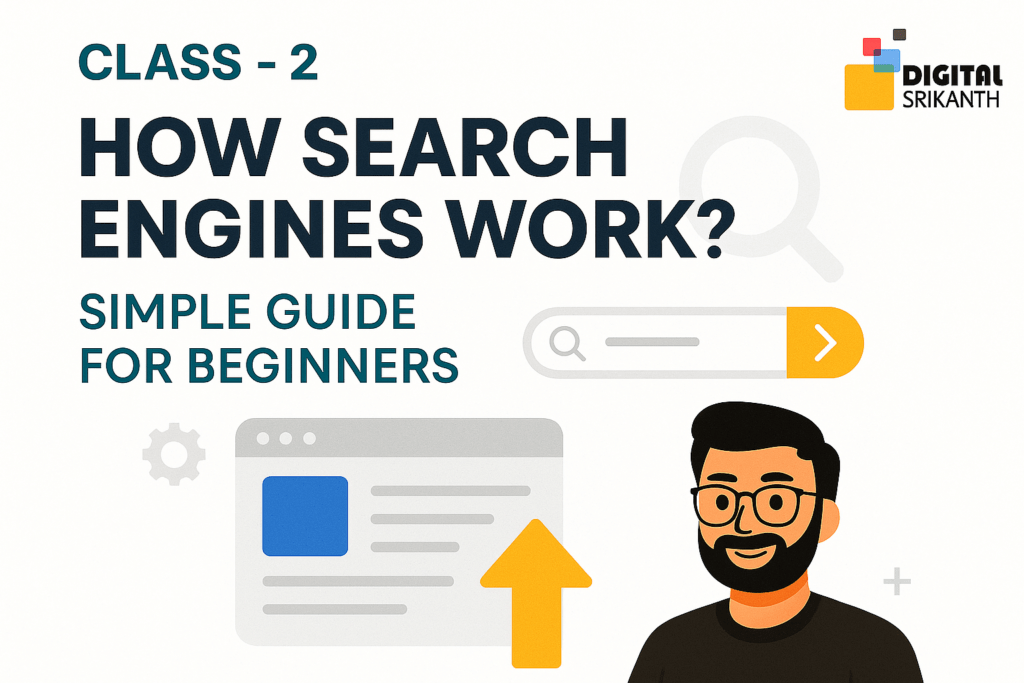Have you ever wondered how Google, Bing or Yahoo show you the right websites when you search for something? You just type a few words, and in a second, thousands of results appear on your screen. But how does this happen? How do search engines know which websites to show first and which ones to leave out?
In this class, we will explain how search engines work in very simple words. No complicated technical terms — just a clear, easy-to-understand guide for beginners. By the end of this article, you’ll know the complete process that happens behind the scenes when you type something in a search box.
“Before we dive into how search engines work, if you’re new to digital marketing, make sure to check out our first class on What is Digital Marketing?”
Let’s start!
What is a Search Engine?
Before we talk about how search engines work, let’s first understand what a search engine is.
A search engine is an online tool that helps you find information on the internet. It quickly searches through millions of websites and shows you results related to what you’re looking for. You can use it to find websites, images, videos, news, and more by typing a word or sentence into the search box.
Here are some of the most well-known search engines:

This is the most popular search engine in the world. Almost everyone uses Google because it is fast, accurate, and easy to use.
Bing

Developed by Microsoft, Bing is another search engine that helps users find information online. It’s often the default search engine on Windows devices.
Yahoo

Yahoo was one of the early search engines that people used before Google became famous. It still has a loyal group of users today.
DuckDuckGo

This search engine is known for protecting the privacy of its users. Unlike other search engines, DuckDuckGo does not track your search history.
When you type a word or a sentence (called a search query) in a search engine, it shows you a list of websites related to your query. This list is called the SERP (Search Engine Results Page).
Why Do We Need Search Engines?
The internet has billions of websites. Without search engines, it would be impossible to find what you’re looking for. Imagine trying to find a recipe or a news article without Google. It would take forever!
Search engines help us by:
- Organizing the information available on the internet.
- Showing the most useful and relevant websites first.
- Making our online searches faster and easier.
How Search Engines Work: The 3 Main Steps
Search engines work in three main steps:
- Crawling
- Indexing
- Ranking
Let’s understand each step in very simple language.
📌 Step 1: Crawling – Discovering New Content
Crawling is like sending tiny robots (called web crawlers or spiders) to explore the internet. These crawlers visit every website, read its content, and follow the links on those pages to discover more websites.
Imagine you’re in a library with millions of books. You send your friend to check every book, read the title, and see what it’s about. This is what crawling does on the internet.
How Crawling Works:
- Crawlers begin their work by visiting a list of known websites.
- They look for new pages and updates on existing pages.
- They navigate from one page to another by following links.
- They gather information like titles, headings, images, and keywords.
- This information is sent back to the search engine.
Examples of Crawlers:
- Googlebot (used by Google)
- Bingbot (used by Bing)
Important Note: Not all websites allow crawlers. Some websites block them using a file called robots.txt.
📌 Step 2: Indexing – Storing Information
Once the crawlers collect information from websites, the next step is indexing.
Indexing means storing and organizing the information collected by the crawlers in a huge digital library called the search index.
Imagine your friend has made notes about every book in the library. Now, he arranges these notes in an order so you can quickly find any book when you need it. This is what indexing does for the internet.
How Indexing Works:
- Search engines store the content found by crawlers.
- The content is sorted by topics, keywords, and importance.
- Duplicate or poor-quality content is often ignored.
- The index is updated regularly as new content appears or old content changes.
Why is Indexing Important?
If a page is not in the search engine’s index, it won’t appear in search results. It’s like a book that’s missing from the library’s record — no one can find it.
📌 Step 3: Ranking – Showing the Best Results
Now comes the most important part — ranking.
Ranking means deciding the order in which search results appear when you type a query. Search engines use special rules (called algorithms) to rank pages.
Imagine you ask your friend to recommend the best books on a topic. He’ll think about which books are most helpful, recent, and easy to understand, and then suggest them to you in order. This is what ranking does for websites.
How Ranking Works:
- When you search for something, the search engine looks in its index.
- It finds all the pages related to your query.
- It uses algorithms to decide which pages are most useful.
- It displays the best results first on the Search Engine Results Page (SERP).
Factors That Affect Ranking:
Search engines check many things before ranking a page, such as:
- Relevance: Does the page match your search?
- Quality: Is the content helpful and well-written?
- Freshness: Is the information up to date?
- Popularity: Do other websites link to it?
- User Experience: Is the site fast, mobile-friendly, and easy to use?
Google uses over 200 ranking factors to decide which websites to show first.
What is a Search Algorithm?
A search algorithm is a set of rules and processes that a search engine uses to find, sort, and rank web pages in response to your search query. In simple words, it’s the system that decides which websites should appear first and which ones should appear later on the search results page.
Search engines like Google regularly update their algorithms to improve the quality of search results and give users the most helpful information.
Some famous Google algorithm updates include:
- Panda Update: Focuses on removing low-quality content and rewarding high-quality, useful content.
- Penguin Update: Targets websites with spammy or unnatural backlinks.
- Hummingbird Update: Helps Google better understand the meaning behind your search (search intent) and show more relevant results.
- Mobile-Friendly Update: Gives higher ranking to websites that work well on mobile devices.
These updates help improve search accuracy and user experience over time.
What Happens When You Search for Something?
Let’s see what happens step-by-step when you type a query into a search engine:
- You type your search query into Google (for example: “how search engines work”).
- Google quickly checks its index for all pages related to your query.
- It uses algorithms to find the most relevant and useful pages.
- It ranks those pages based on various factors.
- It shows the results on the Search Engine Results Page (SERP) — usually within a second!
What is SEO and Why is It Important?
SEO (Search Engine Optimization) is the process of making your website better so that it appears higher in search engine results.
If you have a website, SEO helps you:
- Get more visitors from search engines.
- Appear above your competitors.
- Increase brand awareness and business.
Simple SEO Tips:
- Use relevant keywords in your content.
- Write original, helpful, and well-structured articles.
- Make your website mobile-friendly.
- Improve your website’s speed.
- Get quality backlinks from other trusted websites.
Difference Between Organic and Paid Results
When you search for something on Google, you’ll notice two types of results:
- Organic Results: These are free results shown by search engines based on relevance and SEO.

- Paid Results: These are ads where businesses pay to appear at the top of the search page.

Example:
- If you search for “buy shoes online”, the first few results might be ads.
- Below the ads, you’ll see organic results.
Common Terms You Should Know
- Crawlers/Spiders: These are robots or programs used by search engines to visit and scan websites. They collect information from web pages and help build the search engine’s index.
- Index: A huge digital library where search engines store information from the websites they discover. When you search for something, the engine looks through this index to find results.
- Algorithm: A set of rules and instructions that search engines follow to sort, rank, and display the most relevant web pages in the search results.
- Ranking: The position where a website appears in the search results. Websites with better, more relevant content and good SEO usually rank higher.
- SEO (Search Engine Optimization): A set of techniques used to improve a website’s ranking and visibility in search engine results, helping attract more visitors.
- SERP (Search Engine Results Page): The page you see after entering a search query, showing a list of results like websites, images, videos, and ads related to your search.
How Search Engines Make Money
Most search engines make money through advertising. Businesses pay to show their ads at the top of the search results. This is called Search Engine Marketing (SEM).
Google’s advertising program is called Google Ads. When people click on these ads, the advertiser pays Google. This is known as Pay-Per-Click (PPC) advertising.
Final Thoughts
Now you know exactly how search engines work — in very simple words!
To quickly recap:
- Crawlers explore the internet.
- Indexing stores the information.
- Ranking decides which pages to show first.
- SEO helps websites appear higher in search results.
- Algorithms follow rules to rank pages.
- Search engines make money through ads.
Whenever you search for something, a lot of work happens behind the scenes in seconds — thanks to search engines.
Conclusion
Search engines have made our lives much easier. They help us find any information we need within seconds. By understanding how search engines work, you can better appreciate the technology behind every search you make.
If you run a website or blog, learning about search engines is the first step to improving your online visibility.
Stay tuned for the next class….
where we’ll explain what is SEO? and how you can optimize your website to rank better on search engines.
Frequently Asked Questions
1. How do search engines decide which website appears first?
Search engines use special rules called algorithms. These check how useful, relevant, and trusted a website is before showing it at the top of search results.
2. What are crawlers in search engines?
Crawlers (also called spiders) are small computer programs that visit websites, read their content, and collect information for the search engine to use.
3. What’s the difference between indexing and ranking?
Indexing is when a search engine stores and organizes website information. Ranking is when it decides which websites to show first in search results.
4. Why is SEO important for websites?
SEO (Search Engine Optimization) helps your website appear higher in search results, bring in more visitors, and grow your online presence without paying for ads.
5. How often do search engines update their search results?
Search engines update their results all the time. Crawlers visit websites regularly to check for new or updated content and refresh the search results to show the latest information.
6. What will I learn in the next digital marketing class?
In the next class, you’ll learn what SEO is, why it’s important, and how it works. We’ll explain how websites get to the top of Google search results and how you can improve your own site’s ranking using SEO.
7. How can I follow all the classes in this digital marketing series?
You can visit our website regularly or bookmark our digital marketing full course category page. We’ll post new classes every week to help beginners learn easily and stay updated in 2025.


